
Grallariidae is a family of smallish suboscine passerine birds of subtropical and tropical Central and South America known as antpittas. They are between 10 and 20 cm (4–8 in) in length, and are related to the antbirds, Thamnophilidae, and gnateaters, Conopophagidae.

Grallaria is a large genus of Neotropical birds in the antpitta family Grallariidae.

The chestnut antpitta is a species of bird in the family Grallariidae. It is endemic to Peru. In 2020, two new species previously believed to be populations of chestnut pitta were described: the Oxapampa antpitta and the Ayacucho antpitta; this has left the chestnut antpitta with a much reduced range.

The rufous antpitta was a species of bird in the family Grallariidae that, in 2020, was found to be a species complex made up of 13 visually similar, but distinct species.

Grallaricula is a genus of bird in the family Grallariidae.

The masked antpitta is a species of bird in the family Grallariidae. It is endemic to Bolivia in the city of Riberalta and around. It is in particular located in Puerto Hamburgo and in the Aquicuana Reserve.

The Amazonian antpitta is a species of bird in the family Grallariidae. It is found in Bolivia, Brazil, and Peru. Its natural habitats are subtropical or tropical moist lowland forest and heavily degraded former forest.
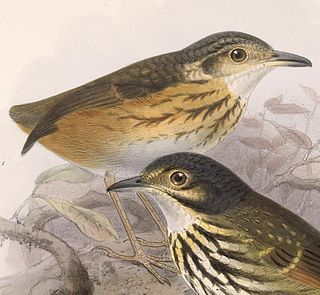
The thicket antpitta is a species of bird in the family Grallariidae. It is found in Colombia, Costa Rica, Honduras, Nicaragua, Panama, and perhaps Ecuador. Its natural habitats are subtropical or tropical moist lowland forest and heavily degraded former forest.

The white-lored antpitta or fulvous-bellied antpitta is a species of bird in the family Grallariidae. It is found in Colombia, Ecuador, and Peru. Its natural habitats are subtropical or tropical moist lowland forest and heavily degraded former forest.

The spotted antpitta is a species of bird in the family Grallariidae. It is found in Bolivia, Brazil, Colombia, Ecuador, French Guiana, Guyana, Peru, Suriname, and Venezuela. Its natural habitat is subtropical or tropical moist lowland forest.
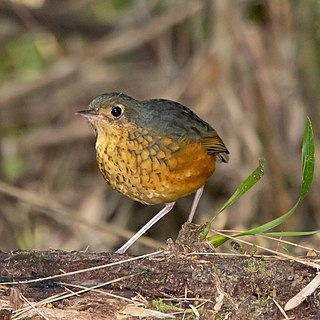
The speckle-breasted antpitta is a species of bird in the family Grallariidae. It is found in Argentina, Brazil, and Paraguay. It is monotypic in the genus Cryptopezus. Its natural habitats are subtropical or tropical moist lowland forest and subtropical or tropical moist montane forest.

The white-browed antpitta is a species of bird in the family Grallariidae. It is endemic to Brazil. Its natural habitats are subtropical or tropical moist lowland forest and dry savanna. It is threatened by habitat loss.
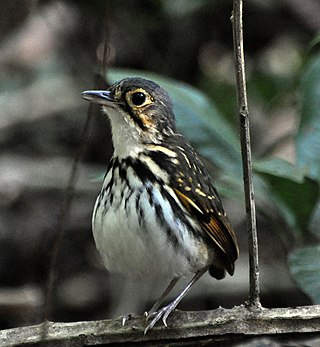
The streak-chested antpitta or spectacled antpitta is a species of bird in the family Grallariidae. It is found in Colombia, Costa Rica, Ecuador, Honduras, Nicaragua, and Panama. Its natural habitat is subtropical or tropical moist lowland forest.

Myrmothera is a genus of birds belonging to the antpitta family Grallariidae that are found in Middle and South America.

The Alta Floresta antpitta is a species of antpitta of the family Grallariidae discovered in 2012.
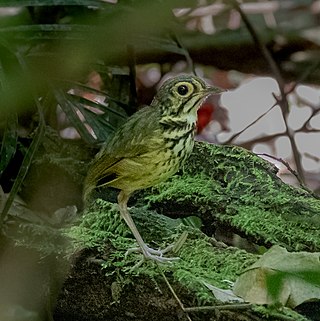
Snethlage's antpitta is a species of antpitta in the family Grallariidae. It was formerly considered conspecific with the spotted antpitta.

The Chamí antpitta is a species of bird in the family Grallariidae. It is endemic to Colombia. It is a member of the rufous antpitta species complex and was first described by Andrés M. Cuervo, Carlos Daniel Cadena, Morton L. Isler and R. Terry Chesser in 2020.
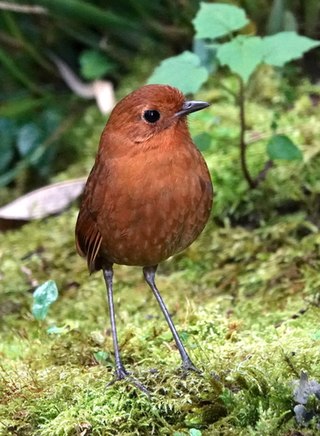
The Equatorial antpitta is a species of bird in the family, Grallariidae. It is a member of the rufous antpitta species complex and in 2020, was found to be a species and not just a subspecies. It is found is southern Colombia, Ecuador, and northern Peru.
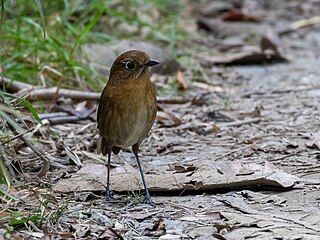
The Sierra Nevada antpitta is a species of bird in the family Grallariidae. It is endemic to the Sierra Nevada de Santa Marta in northern Colombia. It is a member of the rufous antpitta species complex and was recently elevated from subspecies to species based on differences in plumage and vocalizations and genetic evidence.
The Muisca antpitta is a bird in the family Grallariidae. The species was first described by Frédéric de Lafresnaye in 1843. It was formerly considered to be the rufous antpitta, which in 2020 was found to be a species complex composed of 13 species, including the bicolored antpitta. It is endemic to the eastern Andes in northern Colombia and western Venezuela.



















